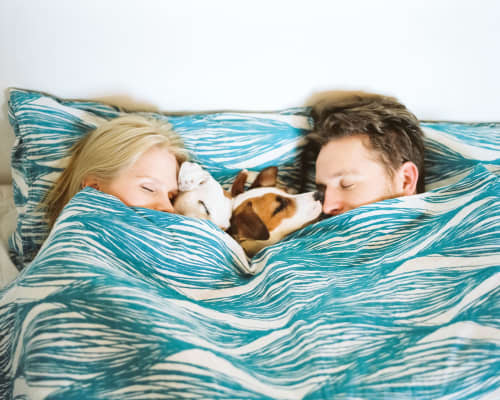
10 Tips For Better Sleep

Quality sleep is essential to your health and yet, The Center for Disease Control estimates that 1 in 3 Americans are sleep deprived. This can negatively impact your life, resulting in a higher risk of depression and heart disease as well as a weakened immune system. If these risks aren’t enough to convince you to consider getting more sleep, the laundry list of positive effects such as better immune function, improved memory, and a boosted metabolism, might. The trouble is that between work, family, and other responsibilities, getting enough sleep can be difficult.
Luckily, we put together a list of 10 ways you can start sleeping better tonight.
1. Invest In A Mattress
The first step in upping your sleep game is to upgrade your mattress. We know the sticker shock can be scary, but if you consider that you spend about one-third of your life in bed, it seems like a good place to invest. With so many options from which to choose, it may be difficult to know where to start, but finding that perfect mattress is well worth the effort.
Note: You should replace your mattress every 10 years or so for the best results.
2. Make Your Bedroom A Sanctuary
Your sleep environment matters. Everything from the temperature to whether or not you have a TV, computer, or phone screen on (if not all 3) impacts your quality of rest. If you can’t live without your electronics, try using blue-light filters. These are available as glasses you can wear or even as apps you can add to your devices.
3. Get Into A Rhythm
Sticking to a regular sleep schedule will acclimate your body’s circadian rhythms (your 24-hour sleep cycle). This prepares your body for rest when you are actually ready for it. With a little discipline, some people are able to wake up in the morning naturally—without the blaring alarm.
4. Avoid Napping
Naps might seem like an easy way to supplement lost sleep, but they can actually disorient your internal clock. This type of sleep tends to be lighter than the truly restorative REM sleep and, therefore, less restful. It can also have the added consequence of leaving you too rested in the evening and less ready to “hit the hay” when the time comes.
5. Light Your Days, Not Your Nights
Light exposure affects your body’s internal clock. It signals to your body that it’s time to be awake, even at night. Lower the lights in your home and avoid blue light from your devices—most have a night setting built in, but you can also use an app for your phone or download a free program like f.lux for your computer.
6. Get Plenty Of Exercise
Exercising every day, even for just 20 minutes, will help you sleep better. A workout not only reduces stress, which leads to better sleep, but it’s also good for your overall health. Just don’t engage in anything too strenuous right before sleeping, or the adrenaline will make drifting off to dreamland more difficult.
7. Wind Down Before Bed
You can assist your body in preparing for sleep by avoiding anything overly agitating. Drinking caffeinated or carbonated beverages, scrolling through your phone, and anything else that triggers you should be avoided at least 2 hours before bed. Finding that nightly ritual that best suits you, whether it’s taking a warm bath, brewing a cup of herbal tea, or reading will help you to relax.
Note: If you do read before bed, try to do so on paper rather than on a screen.
8. Say No To Late-Night Snacking
We’ve all done it, but raiding the fridge too close to bedtime can make falling asleep a pain. From indigestion to bizarre dreams, these are the types of issues that will have you pressing the snooze button come morning. Don’t worry, those delicious leftovers will be waiting for you tomorrow.
9. Water Out, Not In
Staying hydrated is vital but getting up to use the bathroom will interrupt your REM sleep and put a serious damper on your sleep schedule. The same applies to an evening nightcap—the effects of alcohol may help some fall asleep faster, but it will inevitably disrupt your sleep cycle.
10. Seek Help
If you’re still struggling after incorporating these tips into your nightly routine, you may want to consider seeing a sleep specialist who can help diagnose any possible underlying problem such as sleep apnea—a condition that disrupts breathing—and one that many American are unaware they have. A doctor will be able to recommend the best course of action.
We hope these tips really give you something to sleep on. You will feel the difference right away when you get a truly good night’s sleep, and remember the best you is a rested you.

